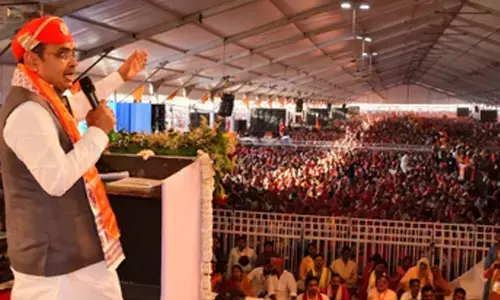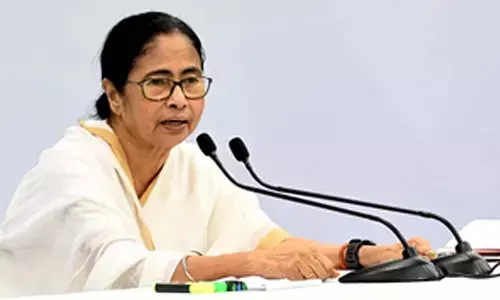Key traits of Intelligence agencies

Key traits of Intelligence agencies
A few of the chiefs of Intelligence in India and abroad have written about their work in the agency they once headed – possibly to make up for the anonymity they had to face on the professional front and tell the world how important their role had been in helping the governance of the country right at the top.
A few of the chiefs of Intelligence in India and abroad have written about their work in the agency they once headed – possibly to make up for the anonymity they had to face on the professional front and tell the world how important their role had been in helping the governance of the country right at the top.
Publishing a book, no doubt, is not everybody's cup of tea. Writing on Intelligence always received media attention which is a sign that enlightened citizens wanted to know about matters relating to national security. To decide what part of operational work that one was privy to, should be kept from the public domain is a judgement call for the writer and it is presumed that at the level of a former chief, it would be taken on a note of professional wisdom.
It is known that Intelligence might provide decisive inputs for the government to take a stand on crucial matters, but it did not 'dictate' policy. In the time of late P V Narasimha Rao as Prime Minister, a plenary meeting was once called by him on Kashmir at a juncture where cross-border terrorism there had touched a new high. Everyone who mattered was present – from Governor to the Army Chief – besides the top bureaucrats and they all favoured a line of immediate action. On being consulted by the Prime Minister, Director Intelligence Bureau (DIB) attending the round table, suggested that "we should hold on" for the present and the former agreed with that. It so happened that the participants (of the meeting) pressed for a 'decision' whereupon the Prime Minister famously told the gathering that "not taking a decision was also a decision."
The success of an Intelligence organisation depends a lot on the professional competence of the officers manning it. Every entrant - high or low in the hierarchy - has to undergo a 'basic' training programme for Intelligence orientation. The leadership of the organisation begins at the 'Desk' and the 'Desk Officer' though only an Assistant Director, is acknowledged as an expert on a subject covered on that desk - for the simple reason that he or she goes through every bit of information made available to the organisation in that sphere.
I remember how I once addressed the 'Basic Course' as a desk officer and noticed two very senior officers sitting in front, listening to me with rapt attention and even taking down notes – one of them became my immediate boss and the other went on to become DIB soon enough. In a successful Intelligence organisation, there is no confusion about credit-sharing, operational decision-making is delegated in an environment of effective supervision and the senior is never evasive about giving guidance that his or her junior associate would ask for.
When I joined IB in May 1964, the Bureau was run from South Block which housed the Prime Minister's Office. In the post-Nehru era, it was shifted to North Block, the seat of the Union Home Minister and the Ministry of Home Affairs. The Intelligence Bureau (IB) handled external Intelligence as well and the IPS officers, selected from amongst those at the top of the list in a batch, were inducted for long-term deputation at the Centre. They were all asked to complete a year of foreign language courses in anticipation of a posting abroad at some point of time.
Soon enough, however, RAW (Research and Analysis Wing) was created in 1968 as a split off from the IB, for exclusive coverage of external Intelligence and put under the Cabinet Secretariat. Incidentally, my Spanish still enables me to read novels in that language even as the ability to converse in Spanish had tapered off. There was an organic link between the two agencies for some time but this faded away gradually as the new organisation progressed to handle its special responsibilities.
For the government, Intelligence agencies were the only instrument for accessing reliable information on matters of national importance. In the 70's during a period of scarcity, field officers of IB furnished information on the price-line of food items in major markets and this was valued as the only source of correct knowledge on which Centre's Civil Supplies Management and Public Distribution System could bank. Intelligence set-up relocated its resources from time to time on a determination of the priorities of the security environment – the prime importance of the impact of International Communism in the Cold War years gave way to the coverage of the new global terror that appeared on the scene with great force in the post-Cold War era.
Intelligence does not share with the masters only what they wanted to hear – it told them what all they had to know. It freely reports on both positives as well as the negatives of the public impact of a policy, to facilitate corrective responses. In the present environment, the adversaries have taken to newer methods of running the 'proxy war' against India – using social media for raising terror cells or 'lone wolves' and arranging funds for them, building anti-India narratives with the help of civil society groups and planning covert attacks on cyber systems of the target, figure prominently among them.
A major threat to India's internal security is minority separatism instigated by Pakistan as part of its National Security Policy of fomenting communal militancy for generating faith-based terrorism. Even as traditional Hindu-Muslim riots had dwindled, violence in the name of 'Jehad' witnessed in Kashmir and elsewhere is the new source of internal destabilisation here.
Intelligence agencies need an outreach in all newer areas of threat and the wherewithal to achieve the same. There are challenges both in the sphere of human Intelligence and Technology.
I became Director IB in mid-1994 when there were no mobile phones and yet the effort was to get to the fastest communication channels, available at the time. These included encrypted messages on Teleprinters using One Time Pad (OTP) which guaranteed an advanced level of security of communication then. Today, securing communications on national security matters is a new challenge and Intelligence agencies have to fully engage themselves with their technology counterparts to deal with the entire range of Cyber Security threats.
Since there was a mention of books written by chiefs of Intelligence, it is only fair to point out that I wrote three books on Intelligence after my retirement, which were well received in professional and public circles - without producing a media splash. They did bring out, with illustrations, how Security could fail not because of lack of 'information' but due to failure of 'communication' or - what is more serious - for the failure of 'action'. They dealt with the principles of Intelligence management - that never become inapplicable - as also the traits of successful Intelligence professionals but more importantly they highlighted the fact that in the Age of Information, Intelligence was not only needed for national security but was also vital for success in any sphere including corporate business and even in the personal domain.
Applied Intelligence is the trend-setter of our times since it means having the ability to read 'what lies ahead' – and this would indicate both opportunities that could be availed of and the risks that had to be avoided. My satisfaction is that these books are considered textbooks in many universities that had a Department of Security Studies and that in Uttar Pradesh they became a recommended reading for 'improving the English language'. My publisher would have wanted me to write about the 'inner stuff' but possibly sensed that I was the 'hard core' kind believing in the non-disclosure of operational work of Intelligence.
In a democratic state, the Charter of Intelligence is pretty well-defined and it is pursued regardless of the political identity of the leadership in power. Its aim primarily is to safeguard the security and sovereignty of the country.
A strong sense of nationalism and acceptance of the democratic tradition of keeping national security above politics, facilitate the working of Intelligence agencies. The Narendra Modi regime gets the credit for enabling the Intelligence set-up to perform at its optimal best - in a major sense, this is because an extremely competent National Security Advisor was available at hand, to the Prime Minister.
(The writer is a former Director of the Intelligence Bureau. Views expressed are personal)








